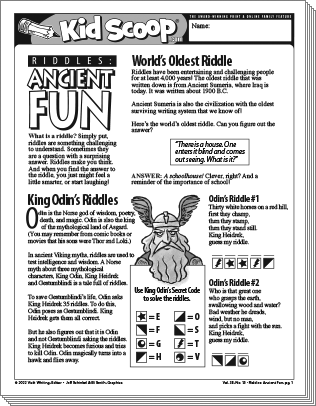 Have riddles been around forever? It seems so. Since ancient times storytellers have shared tales about heroes who solved tricky, funny, or puzzling questions as a test of their cleverness or skills. Riddles can be mysterious, misleading, puzzling, and usually difficult to understand … but only at first. Getting the hang of riddles takes practice and careful reading or listening skills. Riddles always contain clues for solving if you look—or listen—closely. Like a good mystery book, riddles tell a story with a twist! Kid Scoop invites you to read like a detective and see which riddles you can solve. Once you become a master riddle detective, you’ll be able to write your own!
Have riddles been around forever? It seems so. Since ancient times storytellers have shared tales about heroes who solved tricky, funny, or puzzling questions as a test of their cleverness or skills. Riddles can be mysterious, misleading, puzzling, and usually difficult to understand … but only at first. Getting the hang of riddles takes practice and careful reading or listening skills. Riddles always contain clues for solving if you look—or listen—closely. Like a good mystery book, riddles tell a story with a twist! Kid Scoop invites you to read like a detective and see which riddles you can solve. Once you become a master riddle detective, you’ll be able to write your own!
In this issue students will:
- read informational text about the origin of riddles
- try to solve famous riddles
- meet the sphinxes of Giza and Thebes
- calculate sums to discover sphinx facts
- use a code to solve King Odin’s famous puzzler
- write about getting “sweet talked”
- use words in the newspaper to write an acrostic poem
- create a rebus message
- try your hand at riddle writing
7 page PDF
